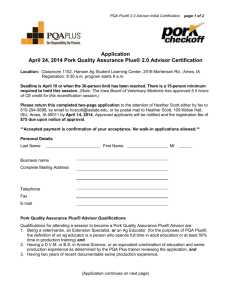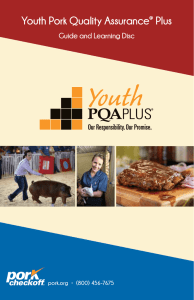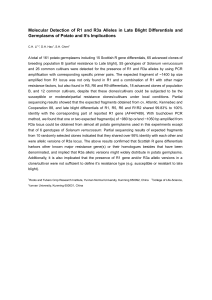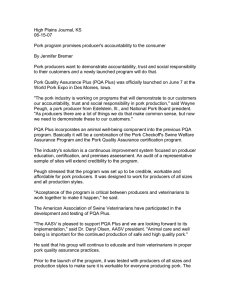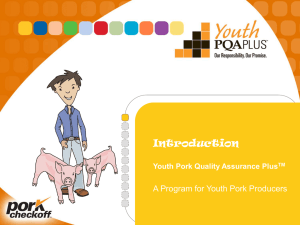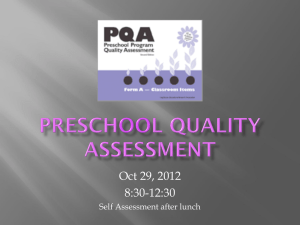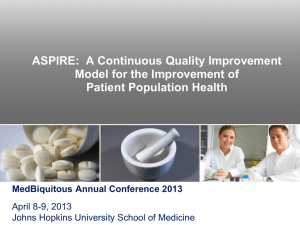Fort Dodge Messenger, IA 06-21-07 Voluntary program helps producers assure food safety
advertisement
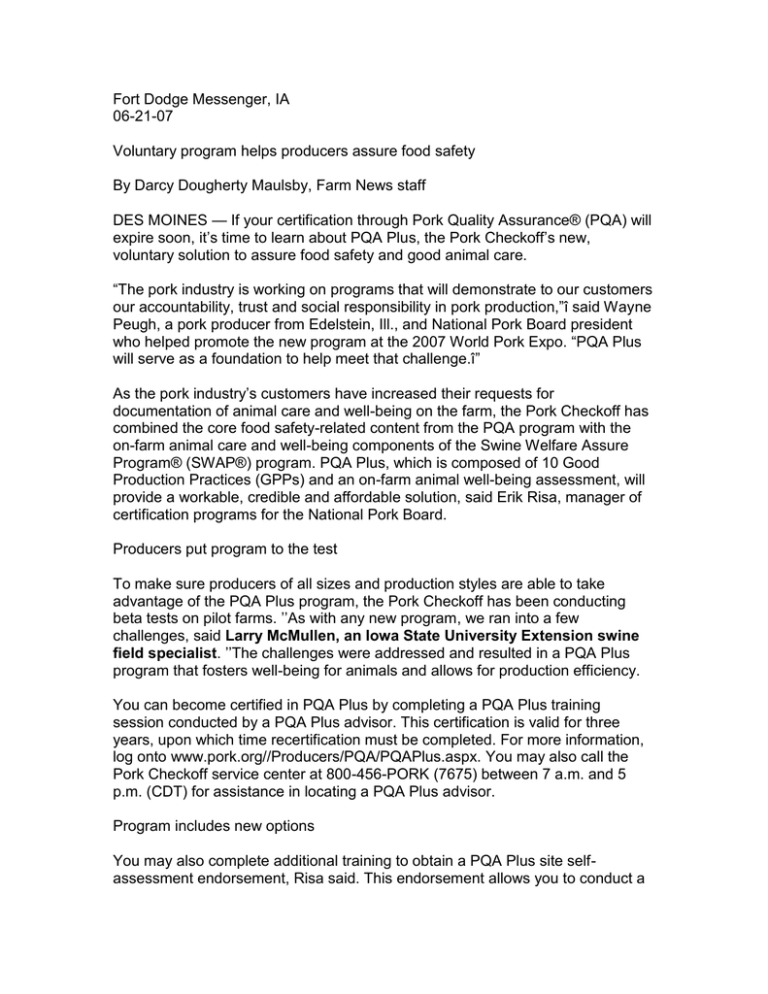
Fort Dodge Messenger, IA 06-21-07 Voluntary program helps producers assure food safety By Darcy Dougherty Maulsby, Farm News staff DES MOINES — If your certification through Pork Quality Assurance® (PQA) will expire soon, it’s time to learn about PQA Plus, the Pork Checkoff’s new, voluntary solution to assure food safety and good animal care. “The pork industry is working on programs that will demonstrate to our customers our accountability, trust and social responsibility in pork production,”î said Wayne Peugh, a pork producer from Edelstein, Ill., and National Pork Board president who helped promote the new program at the 2007 World Pork Expo. “PQA Plus will serve as a foundation to help meet that challenge.î” As the pork industry’s customers have increased their requests for documentation of animal care and well-being on the farm, the Pork Checkoff has combined the core food safety-related content from the PQA program with the on-farm animal care and well-being components of the Swine Welfare Assure Program® (SWAP®) program. PQA Plus, which is composed of 10 Good Production Practices (GPPs) and an on-farm animal well-being assessment, will provide a workable, credible and affordable solution, said Erik Risa, manager of certification programs for the National Pork Board. Producers put program to the test To make sure producers of all sizes and production styles are able to take advantage of the PQA Plus program, the Pork Checkoff has been conducting beta tests on pilot farms. ’’As with any new program, we ran into a few challenges, said Larry McMullen, an Iowa State University Extension swine field specialist. ’’The challenges were addressed and resulted in a PQA Plus program that fosters well-being for animals and allows for production efficiency. You can become certified in PQA Plus by completing a PQA Plus training session conducted by a PQA Plus advisor. This certification is valid for three years, upon which time recertification must be completed. For more information, log onto www.pork.org//Producers/PQA/PQAPlus.aspx. You may also call the Pork Checkoff service center at 800-456-PORK (7675) between 7 a.m. and 5 p.m. (CDT) for assistance in locating a PQA Plus advisor. Program includes new options You may also complete additional training to obtain a PQA Plus site selfassessment endorsement, Risa said. This endorsement allows you to conduct a PQA Plus site self-assessment of an operation you are directly associated with, on your own. It’s valid for up to three years and expires on the same date as your PQA Plus certification, regardless of the date of endorsement. Risa also provided the following answers to common questions about PQA Plus: Q: I work on a farm but I don’t own or market the pigs. Do I need PQA Plus certification? A: While PQA Plus is strictly a voluntary program, Pork Checkoff encourages everyone involved with the production and handling of pigs to become certified. PQA Plus certification, and the training provided, allows you to review and enhance your animal caretaker skills along with an opportunity to demonstrate to the public, and your employer, your commitment to the animals you care for and for the pork industry as a whole. Q: What is the difference between PQA Plus’s site status and certification? A: Site status relates to a specific premises, not a person. Certification relates to an individual, not a premises. An individual can become certified without having a premises with site status or even having a connection with a site at all. However, to gain site status, a premises must have a PQA Plus certified individual associated with the site at the time the site assessment was conducted. Q: What are the audits associated with PQA Plus? A: This involves a third-party auditor who will visit your operation and conduct an audit based on the same points that were assessed during your on-farm site assessment. The purpose of the audit is to verify that the entire PQA Plus program is working. A random sampling of farms that hold site status will be selected for an audit. Q: Will my farm be audited? A: A random sampling of farms that hold site status will be selected for an audit. Your farm has the same probability of being chosen as every other site that holds site status in the program. The results of your on-farm site assessment do not impact your chances of being audited.
